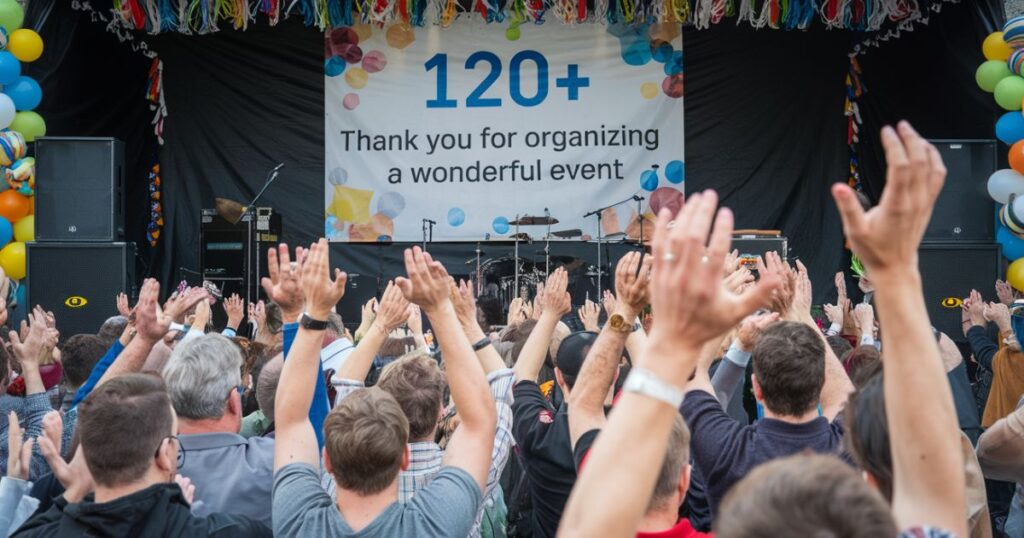Organizing Event an event takes time, effort, and attention to detail. When someone goes above and beyond, it deserves a special thank you. Expressing gratitude for their hard work shows appreciation and strengthens connections.
In this guide, you’ll find 120+ heartfelt thank-you messages to honor the dedication of event organizers Event. Whether it’s a wedding, corporate event, or community gathering, these messages will help you show your genuine gratitude
Corporate Events
- Corporate events bring teams together, foster collaboration, and help build stronger relationships among colleagues and clients. They create lasting memories.
- These events boost company morale, providing a refreshing break from the usual work routine, encouraging creativity and teamwork among employees.
- Corporate gatherings offer valuable networking opportunities, allowing employees to connect with industry leaders, learn new skills, and share innovative ideas.
- Planning a successful corporate event requires detailed organization, from selecting a venue to arranging activities that engage and inspire all attendees.
- Corporate event thank you messages show appreciation to organizers Event who invest time and energy to make these gatherings memorable and impactful.
- Key aspects of corporate events include setting clear goals, ensuring seamless logistics, and creating a positive experience for everyone involved.
- These events are essential for brand promotion, offering a platform for businesses to showcase their values, achievements, and future goals.
- Corporate events provide recognition for employees, rewarding hard work and dedication, and boosting motivation within the company.
- Event planners help customize activities to suit the company’s unique needs, making sure the event aligns with organizational culture and objectives.
- Organizers often coordinate guest speakers, workshops, and entertainment to keep participants engaged, inspired, and excited about the company’s vision.
- Every successful corporate event strengthens team cohesion, allowing employees to relax, recharge, and return to work with fresh perspectives.
- Corporate events often support company growth, fostering relationships with partners, suppliers, and clients that drive business forward.
- Appreciation messages for event organizers Event highlight their dedication to creating an enjoyable experience that reflects the company’s professional standards.
- These gatherings can also include charity components, promoting the company’s commitment to giving back and making a positive community impact.
- Effective corporate events balance learning, fun, and networking, providing attendees with a memorable experience that boosts loyalty and enthusiasm.
Weddings
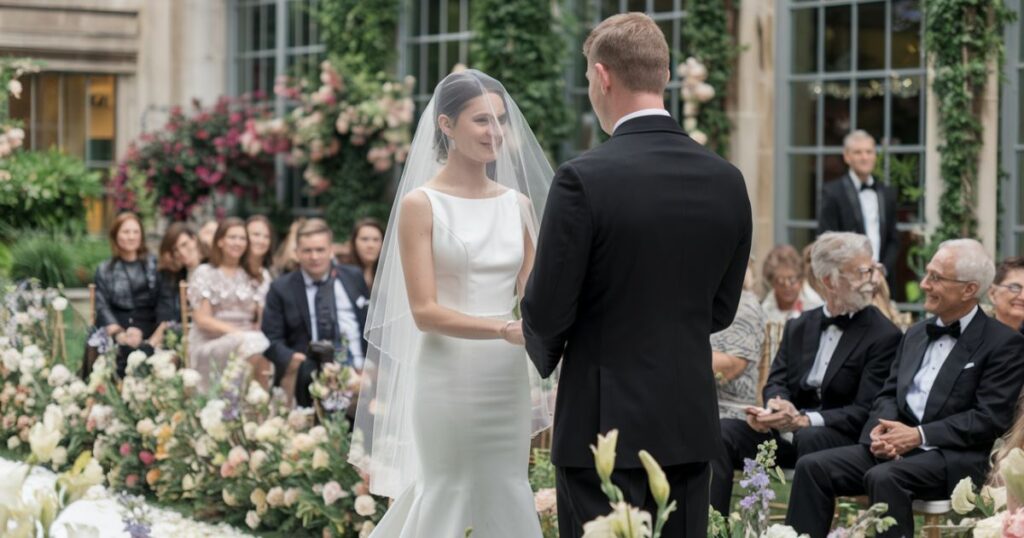
- A wedding is a beautiful celebration of love, where family and friends gather to witness a couple’s new journey together.
- The bride and groom exchange vows, promising to support each other through all of life’s ups and downs.
- Weddings are filled with meaningful traditions, like the first dance, cake cutting, and toasts from loved ones.
- Planning a wedding involves countless details, from choosing the venue to arranging flowers, music, and seating arrangements.
- Guests at a wedding celebrate with food, music, and laughter, creating unforgettable memories for everyone involved.
- A wedding ceremony often reflects the couple’s beliefs, incorporating cultural or religious elements meaningful to them.
- Brides and grooms often spend months or even years planning their dream wedding day.
- Weddings are a unique blend of emotion, joy, and togetherness, celebrating the couple’s commitment to each other.
- The bridal party, including bridesmaids and groomsmen, supports the couple and adds fun to the big day.
- Couples often write personal vows, expressing their promises and hopes for their future together.
- Wedding photos capture the happiness of the day, giving the couple memories to treasure for years.
- Friends and family often travel from far to join the celebration, showing love and support.
- From the ceremony to the reception, each part of a wedding is crafted to make it a perfect day.
- Wedding traditions vary widely across cultures, showcasing unique ways of celebrating love.
- A wedding isn’t just a union of two people; it’s a blending of families, traditions, and dreams.
Birthday Parties
- Planning a birthday party brings friends and family together for a day full of laughter, memories, and unforgettable moments.
- Choosing a theme helps set the tone for the party and makes decorations, activities, and outfits even more exciting.
- Inviting close friends and family creates a cozy, loving atmosphere where everyone feels welcome and enjoys the celebration.
- Fun party games and activities keep everyone entertained, making the party interactive and engaging for guests of all ages.
- A delicious birthday cake is a must have, and blowing out candles is a timeless tradition everyone loves.
- Decorations set the mood with balloons, banners, and streamers that create a festive, colorful backdrop for photos and memories.
- Party favors are small tokens of appreciation that guests can take home, reminding them of the fun they had.
- A carefully selected playlist adds energy and keeps everyone in the celebratory spirit with music they can dance to.
- DIY decorations add a personal touch, allowing you to customize the party’s look without spending too much.
- Photo booths are a hit, giving guests a fun way to capture moments and share laughs with friends.
- Outdoor birthday parties offer space for games and activities, giving kids room to run around and play freely.
- Birthday party themes like superheroes or princesses make the event unique and cater to the birthday child’s interests.
- Sending out thank-you notes after the party shows appreciation and lets guests know their presence was valued.
- Organizing party food ensures guests stay fueled and happy, with options like snacks, finger foods, and a variety of drinks.
- A birthday party schedule helps the event run smoothly, keeping track of games, food, and cake time.
Charity And Fundraising Events
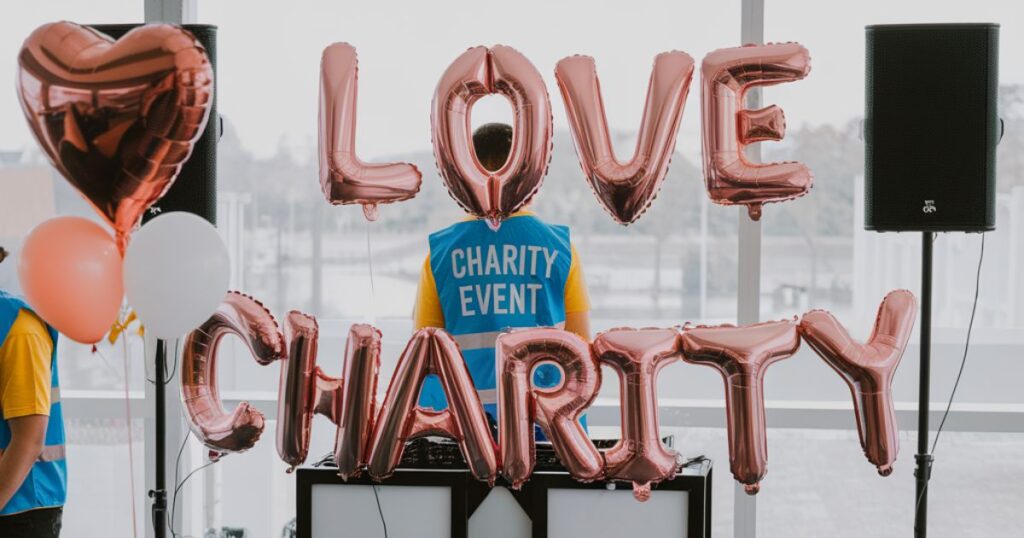
- Charity events bring communities together to support important causes, raising both awareness and funds to make a positive impact.
- Fundraising events are designed to gather donations for specific needs, helping charities reach their goals and make a meaningful difference.
- By attending a fundraising event, participants show their commitment to social causes, inspiring others to get involved and contribute.
- Organizers of charity events focus on engaging the audience, creating memorable experiences that encourage continued support and donations.
- A successful fundraiser combines effective planning, community involvement, and dedicated volunteers, all working toward a shared mission.
- Charity galas, auctions, and marathons are popular fundraising formats, each tailored to attract donations in unique, exciting ways.
- Corporate sponsorship at fundraising events boosts resources while giving companies a chance to support important causes visibly.
- Volunteer involvement is key, as it reduces event costs and builds a community spirit around a charity’s mission.
- Social media promotion helps spread the word about charity events, reaching a wider audience to maximize awareness and contributions.
- Impact stories shared at events show real-life examples of how donations make a difference, motivating attendees to give generously.
- Charity walks and runs encourage physical activity while raising funds, allowing participants to feel actively involved in the cause.
- Virtual charity events provide opportunities for people to donate and engage, regardless of location, making events more accessible.
- Local businesses often contribute by donating goods or services, showcasing community support for charity efforts.
- Post-event thank-you messages to donors and participants strengthen relationships, showing genuine appreciation for their contributions.
- Charity and fundraising events promote a spirit of giving, inspiring communities to come together for meaningful change.
Academic And Educational Events
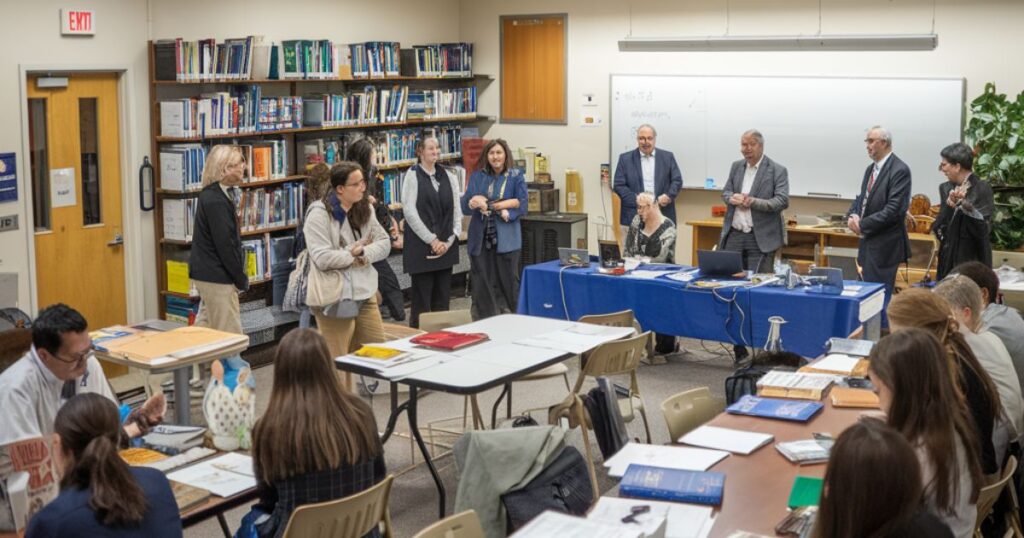
- Academic and educational events foster knowledge sharing, innovation, and growth among students, teachers, and professionals. They encourage learning and networking.
- These events provide a space for educational discussions, fostering critical thinking, creativity, and collaboration among participants with diverse backgrounds.
- Organized conferences, seminars, and workshops create opportunities for students and professionals to exchange ideas and expand their knowledge base.
- Educational fairs bring together experts, providing inspiration and guidance for students on future career paths, skill development, and academic growth.
- Workshops allow hands-on learning experiences, offering participants practical skills and insights into their fields of interest.
- In academic panels, leaders discuss trends, share knowledge, and address industry challenges, giving participants valuable insights into academic advancements.
- Educational events often include career counseling, offering guidance to students on how to succeed in their chosen fields.
- Attendees benefit from discussions on research advancements, gaining up to date knowledge about emerging fields and new discoveries.
- Events like symposiums bring together professionals to exchange ideas, discuss challenges, and share solutions for academic and educational growth.
- Guest lectures provide opportunities for students to hear from industry leaders, helping them to understand real world applications of their studies.
- Science fairs promote creativity and innovation, allowing students to showcase projects and learn from peers and mentors.
- Academic conventions offer networking opportunities with experts, enhancing professional growth and fostering collaborative opportunities for future projects.
- Educational events focus on skill development, equipping students with both hard and soft skills crucial for academic success.
- Panels and discussions bring diverse viewpoints, helping attendees understand complex topics and encouraging critical thinking in academic contexts.
- Educational seminars address current academic challenges, providing insights into solving them and promoting innovative ideas among attendees.
Sports And Fitness Events
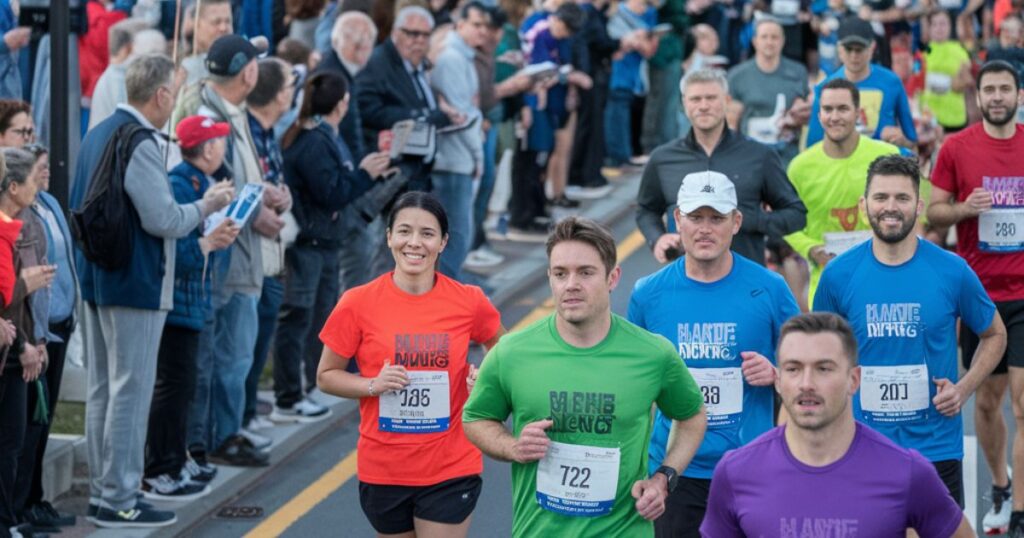
- Sports and fitness events bring people together to celebrate health and competition. They encourage teamwork and promote a healthy lifestyle for everyone.
- Participants can enjoy various activities like running, cycling, or team sports. These events cater to all skill levels, from beginners to experts.
- Community involvement is essential for successful events. Local businesses often sponsor and support sports events, creating a fun atmosphere for all.
- Attending a fitness event offers motivation to push personal limits. Many find inspiration from fellow participants and trainers during these events.
- Networking opportunities abound at sports events. Athletes and fitness enthusiasts can connect, share experiences, and build lasting friendships through shared interests.
- Many events also include educational sessions. Participants can learn about nutrition, training techniques, and injury prevention to enhance their performance.
- Family friendly activities make fitness events enjoyable for all ages. Kids can participate in fun games while adults focus on their fitness goals.
- Events often feature local vendors, offering healthy food options. Participants can fuel up with nutritious snacks and meals after exercising.
- Charity events help raise funds for important causes. Many sports and fitness activities support local charities, promoting community spirit and generosity.
- Sports events provide a great platform for showcasing talent. Athletes can gain recognition and advance their careers by participating in competitions.
- Participants often receive swag bags filled with goodies. These may include t-shirts, water bottles, and coupons for local fitness related services.
- Social media plays a significant role in promoting fitness events. Participants share their experiences, motivating others to join future activities.
- Health and wellness fairs often accompany these events. Attendees can access resources on fitness, mental health, and overall well being.
- Event organizers work hard to ensure safety. Proper measures are in place to protect participants and spectators during the activities.
- Sports and fitness events create lasting memories. Whether winning a medal or making new friends, these experiences positively impact everyone involved.
Cultural And Arts Events
- Cultural and arts events celebrate creativity and diversity. They showcase talents from various backgrounds, enriching communities and promoting understanding among people.
- These events often feature live performances, art exhibitions, and workshops. They provide opportunities for artists to connect with audiences and share their passion.
- Attending a cultural event fosters appreciation for different traditions. Participants can learn about unique customs and experiences that shape our world.
- Community engagement is key to cultural events. They bring people together, creating a sense of belonging and shared experiences among attendees.
- Arts festivals often highlight local artists. This support boosts the economy and encourages creativity within the community, fostering future talent.
- Many cultural events incorporate food and music. These elements enhance the experience, allowing attendees to enjoy diverse flavors and sounds.
- Educational programs often accompany arts events. Workshops and discussions provide insight into the creative process and inspire attendees to explore their artistic side.
- Volunteering at cultural events offers valuable experience. It helps individuals develop skills, meet new people, and contribute to the community.
- Cultural and arts events can attract tourists. Visitors often seek out unique experiences that showcase the local culture, benefiting the economy.
- Social media plays a vital role in promoting these events. Online platforms help organizers reach wider audiences and create buzz around activities.
- Many arts events celebrate historical significance. They honor the heritage of communities, preserving stories and traditions for future generations.
- Cultural events encourage collaboration among artists. Different mediums can come together, leading to innovative projects that inspire and entertain audiences.
- Attending these events boosts mental well being. Engaging with art and culture provides a creative outlet and can improve overall happiness.
- Many cultural events focus on inclusivity. They ensure that everyone, regardless of background or ability, can participate and enjoy the experience.
- Ultimately, cultural and arts events enrich lives. They foster connections, inspire creativity, and celebrate the beauty of human expression.
Technology And Innovation Events
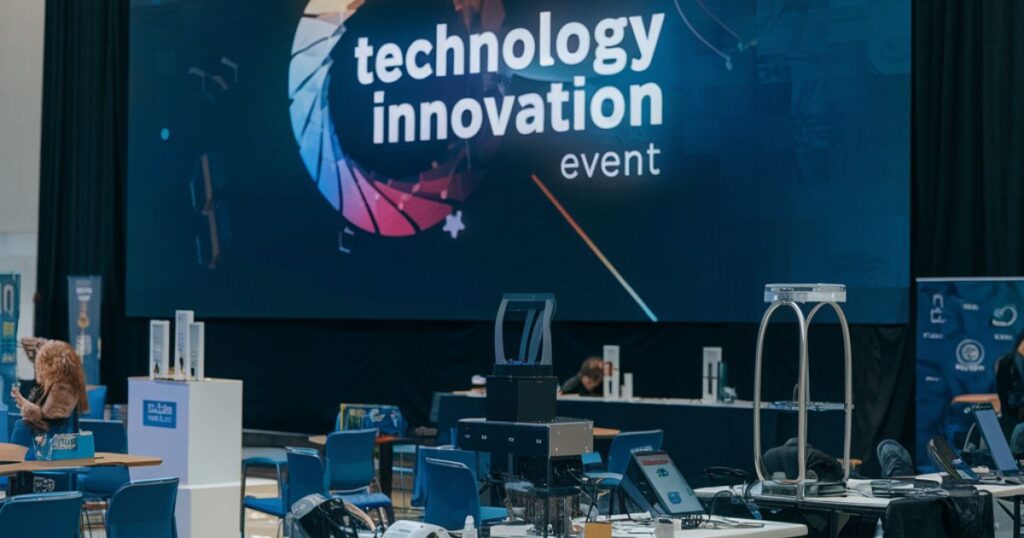
- Technology and innovation events showcase the latest advancements in tech. They bring together experts to discuss emerging trends and ideas.
- Attendees can learn about new tools and solutions that can improve efficiency. Networking opportunities are plentiful at these events.
- Workshops and demonstrations allow participants to experience new technologies firsthand. This hands-on approach encourages deeper understanding and engagement.
- Keynote speakers often share insights on future technology directions. Their expertise inspires attendees and ignites discussions about what’s next in innovation.
- Startups frequently showcase their groundbreaking products at these events. This platform helps them gain visibility and attract potential investors.
- Panel discussions feature industry leaders addressing current challenges. These conversations provide valuable perspectives on navigating the tech landscape.
- Many events offer opportunities for collaboration among attendees. Partnerships can emerge, leading to exciting new projects and innovations.
- Virtual technology events have become popular, allowing global participation. This accessibility broadens the audience and enhances diverse discussions.
- Exhibitor booths allow companies to display their latest innovations. Attendees can interact directly with product representatives to learn more.
- Networking events help professionals connect and exchange ideas. Building relationships can lead to future collaborations and career opportunities.
- Hackathons are often part of technology events, promoting creativity. Participants work in teams to solve real world problems within a limited timeframe.
- Innovations in fields like AI, IoT, and blockchain are frequently discussed. These topics are shaping the future of technology and industry.
- Participants gain insights into industry trends that can influence their businesses. Staying informed is crucial in today’s rapidly evolving tech environment.
- Many events include awards to recognize outstanding achievements. This recognition motivates companies and individuals to strive for excellence.
- Attending technology and innovation events is essential for professionals. They provide knowledge, inspiration, and the chance to be part of the future.
Environmental And Sustainability Events
- Environmental events focus on raising awareness about sustainability. They educate the public on reducing waste and conserving natural resources.
- Participants learn how to adopt eco-friendly practices. This includes recycling, composting, and using renewable energy sources in daily life.
- Workshops often provide hands-on activities. Attendees can create their own sustainable products, like reusable bags or natural cleaning supplies.
- Sustainability events often feature guest speakers. Experts share insights on climate change, biodiversity, and the importance of protecting our planet.
- Many events encourage community involvement. Volunteers can participate in local clean-ups or tree planting initiatives to support environmental efforts.
- Networking opportunities abound at these gatherings. Attendees can connect with like minded individuals and organizations committed to sustainability.
- Exhibitors showcase innovative green technologies. This allows participants to discover new products that promote a healthier planet and lifestyle.
- Educational materials are often provided. Attendees leave with resources to implement sustainable practices at home and in their communities.
- Environmental festivals celebrate nature with fun activities. These include eco friendly crafts, organic food vendors, and live music to engage participants.
- Many events incorporate interactive displays. These hands-on experiences help attendees visualize their impact on the environment and inspire action.
- Attendees are encouraged to share their experiences. Social media platforms allow participants to spread awareness about sustainability initiatives and events.
- Panel discussions provide a platform for dialogue. Experts and community leaders discuss pressing environmental issues and potential solutions.
- Family-friendly activities often take place at these events. Kids can learn about nature and sustainability through games, crafts, and storytelling.
- Local businesses often support environmental initiatives. They provide sponsorships or donations to help make events successful and impactful.
- Ultimately, these events foster a sense of community. Together, participants can work towards a more sustainable future for everyone.
Read Also: 35+ Silent Treatment Comebacks: Outsmart Anyone With Ease!
Community And Social Events
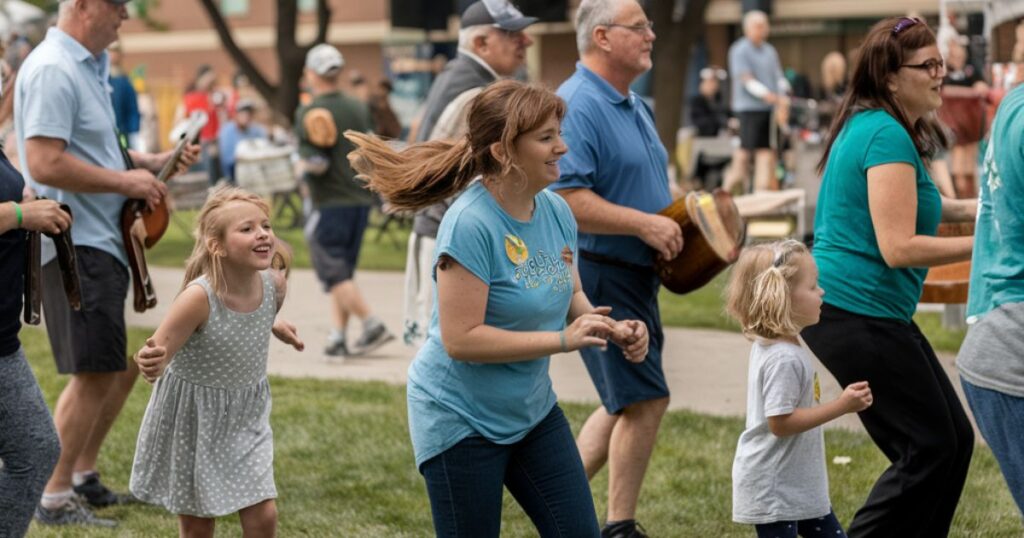
- Community events bring people together. They create opportunities for connection and foster friendships, strengthening the bonds within neighborhoods and towns.
- Social gatherings encourage engagement among residents. They promote interaction and help build a sense of belonging within the community.
- These events often feature local businesses. Supporting them boosts the economy and showcases unique products and services available in the area.
- Volunteer opportunities at community events are abundant. They allow individuals to contribute, gain experience, and develop new skills while helping others.
- Many social events focus on entertainment. They can include music, food, games, and activities that create a fun atmosphere for all.
- Cultural celebrations highlight diversity. They showcase traditions, food, and art, allowing communities to appreciate their unique heritage and share experiences.
- Community events can raise awareness for important causes. They often include fundraising activities to support local charities and organizations in need.
- Educational workshops offer valuable knowledge. These sessions help residents learn new skills, from cooking to financial planning and everything in between.
- Family-friendly activities make community events enjoyable for all ages. They encourage parents and children to participate together and strengthen family bonds.
- Social gatherings can promote health and wellness. They often include fitness activities, encouraging residents to lead healthier lifestyles while having fun.
- Seasonal events celebrate the changing times. From summer fairs to winter festivals, they bring excitement and joy throughout the year.
- Community events foster local pride. They help residents appreciate their surroundings and the people who contribute to their vibrant neighborhoods.
- These gatherings create lasting memories. People remember the friendships and experiences shared, helping build a stronger sense of community.
- Attending social events provides networking opportunities. They allow individuals to meet new people and form connections that can benefit personal and professional lives.
- Organizing community events requires teamwork. Collaboration among residents, businesses, and local organizations ensures successful and enjoyable experiences for everyone involved.
Virtual And Hybrid Events
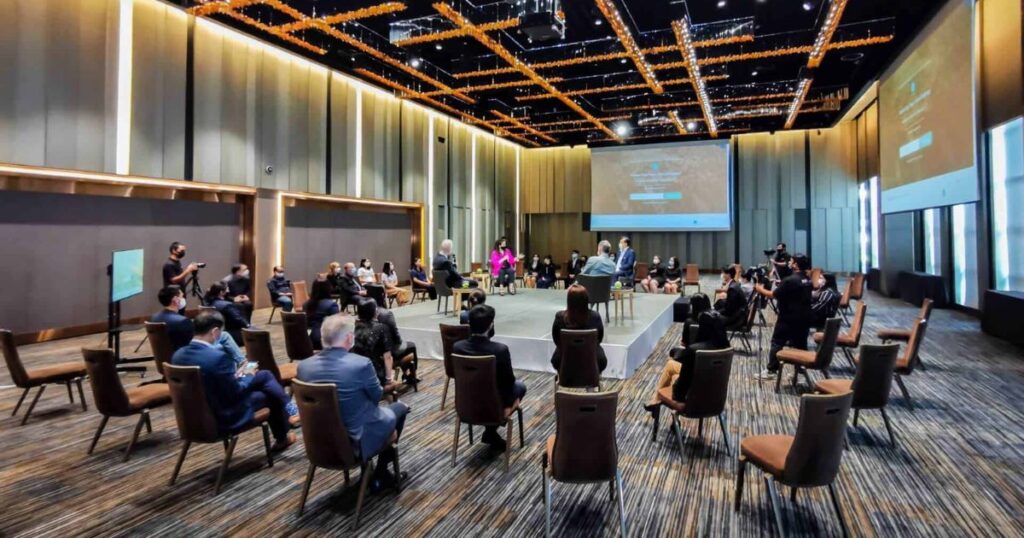
- Virtual events connect people online, allowing participants to join from anywhere. They eliminate geographical barriers and save travel time.
- Hybrid events combine in person and virtual experiences. This setup engages both on-site attendees and those joining online simultaneously.
- Technology plays a crucial role in virtual events. Reliable platforms ensure smooth streaming, interactive sessions, and effective audience engagement throughout.
- Networking in virtual events happens through chat rooms and breakout sessions. Attendees can easily meet others and share ideas online.
- Planning a virtual event requires careful attention to detail. Event organizers must consider tech requirements, content, and attendee experience.
- Hybrid events offer flexibility for attendees. Participants can choose how they want to attend, whether in person or virtually.
- Engaging content is vital for virtual events. Interesting speakers, interactive polls, and Q&A sessions keep the audience involved and attentive.
- Marketing virtual events effectively increases attendance. Social media promotions, email invitations, and engaging visuals attract a wider audience.
- Feedback after virtual events is essential. It helps organizers improve future events and understand attendees’ preferences and experiences better.
- Virtual events can be cost effective. They often require fewer resources, like venue rentals, making them a budget friendly option.
- Security is crucial for virtual events. Protecting attendee data and ensuring safe online interactions build trust among participants.
- Recording virtual events allows for on-demand viewing later. This feature enables those who missed the live event to catch up.
- Accessibility is a significant advantage of virtual events. They can cater to diverse audiences, including those with disabilities or remote locations.
- Virtual events can include diverse formats. Webinars, workshops, and panel discussions provide varied experiences that keep participants engaged.
- Measuring success in virtual events involves analytics. Tracking attendance, engagement, and feedback provides insights into what worked well.
Holiday And Seasonal Events
- Holiday and seasonal events bring people together to celebrate important traditions. They create lasting memories and strengthen community bonds during festive times.
- These events often feature unique decorations that reflect the spirit of the season. They brighten public spaces and create a joyful atmosphere.
- Food plays a central role in holiday celebrations. Special dishes and treats are shared, enhancing the experience for everyone involved.
- Seasonal activities like ice skating, hayrides, or pumpkin carving add fun to the celebrations. They engage families and encourage community participation.
- Holiday events often include performances such as caroling, plays, or dance shows. These entertain and inspire people of all ages.
- Community involvement is essential for successful holiday events. Volunteers help organize and ensure everything runs smoothly for a great experience.
- Many holiday celebrations incorporate cultural traditions. This promotes understanding and appreciation for diverse backgrounds and enriches the community experience.
- Seasonal events often feature local vendors showcasing handmade crafts. This supports small businesses and adds unique items to the holiday shopping experience.
- Attending holiday events provides opportunities to meet new people. Making connections strengthens friendships and fosters a sense of belonging.
- Holiday lights and decorations create a festive atmosphere. They bring joy to neighborhoods and encourage people to explore their surroundings.
- Organizing events requires planning and creativity. Coordinators work hard to ensure everything aligns with the holiday theme and engages the audience.
- Children especially look forward to holiday events. Activities like face painting, crafts, and visits with Santa create magical experiences for them.
- Music is an integral part of holiday celebrations. It sets the mood and brings people together through familiar songs and lively performances.
- Seasonal events offer a chance to give back. Many include charity components, encouraging attendees to donate and support local causes.
- After the holidays, reflections on the events help plan future gatherings. Feedback is essential for improving and creating even better celebrations next year.
Bonus Tips for Expressing Gratitude
Expressing gratitude is important for building relationships. A simple “thank you” can make someone’s day brighter. Personalize your message to show genuine appreciation.
Consider writing a thank you note or email. This adds a thoughtful touch to your gratitude. Remember, sincere acknowledgment of someone’s effort goes a long way.
Personalizing Messages
- Tailor your message to the recipient’s interests or preferences to show you care.
- Use specific examples of what you appreciate to make your message more meaningful.
- Include the person’s name in the message to create a personal connection.
- Reference past conversations or shared experiences to enhance your message’s relevance.
- Use a friendly tone that reflects your relationship with the recipient.
- Mention how their actions positively impacted you or others to highlight their importance.
- Choose a format that suits the recipient, whether it’s a handwritten note, text, or email.
- Add a personal touch, like a favorite quote or inside joke, to make the message unique.
Cultural Considerations
- Understand cultural norms: Different cultures have unique customs regarding greetings, gifts, and communication styles. Familiarize yourself with these to show respect.
- Be mindful of language: Language barriers can affect understanding. Use clear, simple language and be patient when communicating.
- Respect dietary restrictions: Some cultures have specific dietary practices. Always inquire about food preferences when planning events or meals.
- Acknowledge diverse holidays: Recognize and respect various cultural celebrations and holidays. This inclusivity fosters a sense of belonging for everyone.
- Adapt your communication style: Some cultures prefer direct communication, while others value indirect approaches. Adjust your style accordingly to connect better.
- Consider non-verbal cues: Body language varies across cultures. Pay attention to gestures and expressions, as they can have different meanings.
- Be aware of time differences: Cultural attitudes toward punctuality can vary. Be respectful of differing perspectives on time when scheduling meetings or events.
- Encourage open dialogue: Create an environment where individuals feel comfortable discussing their cultural backgrounds. This openness promotes understanding and collaboration.
Digital Options for Sharing Gratitude
- Social Media Posts: Share a heartfelt thank you message on platforms like Facebook or Instagram. Tag the person to make it personal.
- E-Cards: Use online services to send beautiful ecards. Choose designs that reflect your appreciation and add a personal message.
- Video Messages: Record a short video expressing your gratitude. This adds a personal touch and shows your sincerity.
- Emails: Send a thoughtful email outlining your appreciation. Be specific about what you’re thankful for to make it more meaningful.
- Text Messages: A quick text can go a long way. Send a simple message to express your thanks anytime, anywhere.
- Group Chats: Use messaging apps to share gratitude in group settings. Acknowledge the efforts of multiple people at once.
- Blogs or Websites: Write a blog post or a thank-you section on your website. This allows you to publicly recognize someone’s efforts.
- Online Surveys: If applicable, use feedback forms to express gratitude for specific contributions. This shows that you value their input.
Timing Advice
- Plan Ahead: Consider your audience and choose the right moment for your message or action. Timing can significantly impact effectiveness.
- Know the Context: Pay attention to events or situations happening around you. Timing your response to align with current events can enhance relevance.
- Be Patient: Sometimes, waiting for the right moment can lead to a better outcome. Don’t rush into decisions or responses.
- Check the Mood: Gauge the atmosphere before speaking or acting. A lighthearted moment may be ideal for sharing good news or humor.
- Follow-Up: If you missed the perfect moment, it’s okay to follow up later. Acknowledging the delay can still show your commitment.
- Respect Deadlines: Be mindful of timelines and deadlines. Timely responses show professionalism and respect for others’ time.
- Utilize Reminders: Set reminders for important dates or follow ups. This helps you stay on track and ensures you don’t miss opportunities.
- Adjust to Feedback: If your timing isn’t received well, be open to adjusting. Learning from experience can improve your timing in the future.
Gift Pairing Ideas
- Pair a cozy blanket with a set of hot cocoa mugs for a perfect winter gift.
- Combine a beautiful plant with a decorative pot for a refreshing touch to any home.
- Gift a cookbook alongside a set of high quality kitchen tools for the aspiring chef.
- Pair a scented candle with a relaxing bath set for a thoughtful self care package.
- Combine a stylish notebook with a nice pen for the writer or planner in your life.
- Gift a movie night basket with popcorn, candy, and a selection of classic films.
- Pair a custom mug with a selection of gourmet teas or coffees for the beverage lover.
- Combine a puzzle with a fun snack assortment for a cozy game night experience.
How to Respond to Thank-You Messages
- You’re very welcome! I’m glad I could help and make a difference.
- No problem at all! It was my pleasure to assist you.
- Thank you for your kind words! I’m happy to have been of help.
- I appreciate your thanks! Let me know if you need anything else.
- You’re welcome! I’m always here to support you whenever you need.
- It was my pleasure! Your gratitude means a lot to me.
- I’m so glad you found it helpful! Thank you for reaching out.
- No need to thank me! I’m just glad I could contribute.
Relevant Hashtags for Social Media Sharing
Use #Gratitude to express appreciation and share your thankful moments with others.
Incorporate #ThankYou to highlight acts of kindness and recognition.
Utilize #EventPlanning for posts related to organizing and managing events.
Share your experiences with #EventAppreciation to celebrate the efforts of organizers.
Use #CommunitySupport to highlight local events and initiatives that foster community involvement.
Include #HolidayEvents for seasonal celebrations and festive gatherings.
Engage with #ThankfulThursday to join a weekly trend of sharing gratitude.
Leverage #SocialMediaThankYou to connect with others who appreciate the power of thanks online.
Benefits of using these ways instead of “Thank You For Organizing a Wonderful Event”
Using different phrases instead of “Thank you for organizing a wonderful event” can make your gratitude more impactful. It adds variety and keeps your appreciation fresh. Personalized messages can resonate more with the recipient and make them feel special.
Additionally, creative expressions of gratitude can strengthen relationships. They show that you put thought into your message. This effort can encourage future collaborations and enhance connections within the community.
Conclusion
Expressing gratitude for those who organize events is essential for building strong relationships and fostering community spirit. The 120+ thank you messages provided can serve as a heartfelt way to acknowledge the hard work and dedication of event planners.
Whether it’s a simple note or a more elaborate expression of appreciation, these messages will help convey your genuine thanks. Recognizing their efforts not only honors their contributions but also encourages future collaborations and supports a positive atmosphere.
FAQ’s
How do you say thank you for organizing a wonderful event?
You can say thank you by sending a personalized note expressing your appreciation for their hard work and dedication. Acknowledge specific details about the event that you enjoyed to make your message more meaningful.
How do you praise someone for organizing an event?
Praise someone for organizing an event by highlighting their hard work and attention to detail. A simple compliment like “Your efforts made this event unforgettable!” shows genuine appreciation.
How do you express gratitude for an event?
To express gratitude for an event, you can send a heartfelt thank you note or message to the organizers. Additionally, sharing your appreciation publicly on social media can enhance your acknowledgment of their efforts.
How do you say thank you after an event?
You can say thank you after an event by sending a personalized note or message to the organizers. Express specific appreciation for their hard work and the impact the event had on you.
